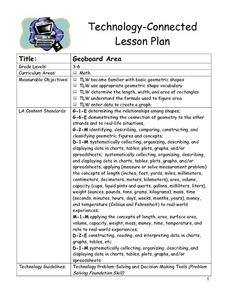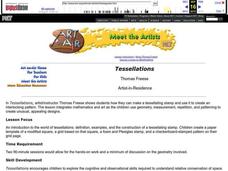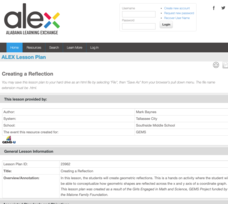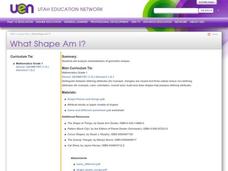Curated OER
Patterns in the Sums of Polygon Angles
Sixth graders discover the patterns of sums of polygon angles. In this math lesson, 6th graders study the properties of geometric shapes to solve problems as they participate in hands-on activities.
Curated OER
Sequences and Series
In this sequences and series activity, students find the sum of a given geometric series. They use sigma notation to express a geometric series. This one-page activity contains 12 problems.
Curated OER
TAKS 3rd Grade Daily Upkeep 2
In this TAKS worksheet, 4th graders identify the number of sides in a shape, discover a pattern, and find the sum of several numbers. Questions relate to objectives covered on the Texas state test. This would be good bell work.
Curated OER
Shape Patterns
In this math worksheet, students examine a pattern of geometric shapes. After looking at the sequence of shapes and deciding what the pattern is, students choose the shape that would come next. There are 4 problems.
Curated OER
Sequences, Counting and Probability - Week 4
In this sequence worksheet, students complete problems involving geometric sequences. They identify the nth term in a sequence. Students explore various positions in the Fibonacci sequence. This two-page worksheet contains eight...
Curated OER
Measuring Pattern Block Angles
Sixth graders identify various angles by using pattern blocks. For this measurement lesson, 6th graders find out how many degrees are in each of the different angles of the various pattern blocks.
Curated OER
Attributes and Patterns with Buttons
Students work with attribute buttons in order to sort, create, and analyze patterns. Students practice identifying patterns and verbalizing the sorting rules and patterns they used. Sample assessments and rubric are provided.
Curated OER
Geoboard Squares
Students create squares of different sizes on a geoboard. They find and describe a pattern. Students use the pattern to determine the number of squares possible on a 10-by-10 geoboard. They create squares with a horizontal base (and...
Curated OER
Falling Into Geometry Through Paper Art
Students explore geometric shapes. In this kindergarten geometry lesson, students create a fall quilt consisting of three different paper geometric quilt squares that when assembled form a scarecrow, a pumpkin, and a crow.
Curated OER
Rep Tiles
Third graders use pattern blocks of one shape at a time to try to create a similar shape. They compare the perimeter of the new figure with the perimeter of the original shape and look for a pattern. Students use the pattern to predict...
Curated OER
Geo-Wrap Vests
First graders use geometric shapes to create and extend patterns. Students read a book and view African garments. They identify patterns in the garments. Students create and decorate a paper vest with geometric patterns.
Curated OER
Patterns and Functions
Learners investigate properties of perimeter and area. In this middle school mathematics lesson, students explore patterns in a problem solving context. Learners model and solve problems using various representations for the data as they...
Curated OER
Geoboard Area
Students explore the basic geometric shapes and geometric shape vocabulary through the use of geoboards and virtual geoboards. They create a variety of shapes with a partner, build ten different rectangles on their geoboards, and...
Curated OER
What's the Best Deal?
Young scholars explore number sense by solving consumer math problems. In this pattern identification lesson, students analyze a list of numerical and geometric patterns while predicting the future outcome. Young scholars utilize...
Curated OER
Tessellations
Students learn and review basic geometric terms, definitions, and theory, including regular polygons, lines, angles, points, etc. They make a tessellating stamp and create a repeating work of art.
Curated OER
Shapes and Introduction to Geometry
Students make a quilt. In this geometry lesson, students discuss patchwork quilts and learn some different geometric shapes and patterns that are commonly used. Students explore designs with triangles and squares and then make their own...
Curated OER
An Introduction to Sequences
Fourth graders are introduced to arithmetic and geometric sequences. In this mathematics lesson, 4th graders produce a variety of sequences by varying the starting number, multiplier, and the add-on number.
Alabama Learning Exchange
Creating a Reflection
Investigate geometric reflections in this geometry lesson. Create geometric reflections that show the reflection across the x and y axis of a coordinate graph. Learners watch a teacher demonstration before proceeding on their own. They...
Curated OER
What Shape Am I?
First graders analyze characteristics of geometric shapes. They identify, describe, and create simple geometric figures. They analyze characteristics of geometric shapes and determine the defining attributes of a circle,...
Curated OER
Why is this lesson constructivist?
Students formulate a definition of tessellations by comparing and contrasting different patterns and shapes of real objects. They discuss the relatioship between shapes and patterns as well as their function in the real world. Students...
Curated OER
Honors Algebra 2 Reivew: Practice with Sequences
In this practice with sequences worksheet, students find the arithmetic sequence and geometric sequence of given problems. They determine the percent of change and solve exponent problems. This one-page worksheet contains 11 problems.
Curated OER
Rhythm and Art: Rhythm Collage
Students create a collage in response to musical rhythm. In this visual arts lesson plan, students will better understand the connection between visual arts and musical rhythm. Students will follow the teacher's model of letting the...
Pennsylvania Department of Education
Volume of Regular and Irregular Objects
Fifth graders examine patterns and relate to equations to solve math problems. In this patterns lesson, 5th graders diagram, graph, use models and use tables to solve equations for real world problems.
Pennsylvania Department of Education
Volume of Compound Figures
Fifth graders use patterns, models and relationships to solve equations. In this equations lesson, 5th graders define vocabulary for equations and complete worksheets explaining variables and solving problems.

























